How You Feel About Crying, Based On Your Myers-Briggs® Personality Type
Have you ever wondered why some people cry easily while others seem to have no tear ducts whatsoever? Or why certain people seem to open up about their feelings without hesitation while others hold back? It turns out your Myers-Briggs® personality type could explain a lot about how you handle emotions—whether it’s crying, sharing your feelings, or reacting to others’ emotional breakdowns.
As an MBTI® practitioner, I’ve seen patterns for over a decade of work with thousands of different people. But I wanted some data organized to look at (I know, how very INTJ of me). With this in mind, I surveyed nearly 6,000 people to uncover some trends that show how different types feel about crying and how it affects them. Read on to find out where you fit in!
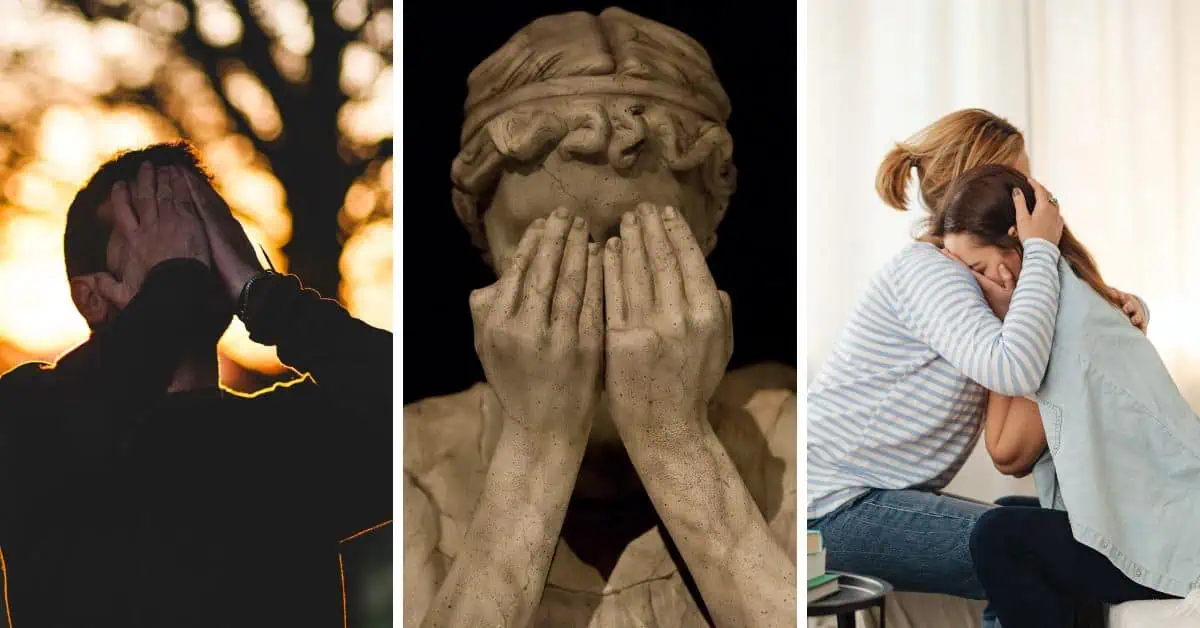
Not sure what your personality type is? Take our personality questionnaire here. Or you can take the official MBTI® here.
How You Feel About Crying, Based On Your Myers-Briggs® Personality Type
1. Do You Get Embarrassed When You Cry?
Crying is a natural human experience, but some people feel more self-conscious about it than others. Here’s what the survey revealed about which types feel the most—and least—embarrassed when they cry.
Most Embarrassed to Cry:
- ENTJs (73.69%) and ENTPs (73.68%) top the list, feeling the most awkward when they cry, particularly in public. These Thinking types tend to value logic over emotion, so crying can feel out of character for them.
- INTPs (71.43%) and INTJs (72.46%) are also likely to feel embarrassed when they cry. They may see crying as a sign of losing control, which doesn’t sit well with their private nature.
Least Embarrassed to Cry:
- ESFPs (23.34%) and ENFPs (29.54%) are the most comfortable with their tears. These Feeling types see crying as a natural part of life and nothing to be riled up about.
What does this tell us? People who have a preference for Intuition and Thinking are more likely to feel self-conscious when their emotions show. After all, the four types most embarrassed about their own crying were NT “Strategist” personality types. These types hate losing control, and when I say hate, I mean it makes them feel like they just showed up at a school without remembering to get dressed.
David Keirsey, a psychologist and author of Please Understand Me, said of Intuitive Thinking types, “The NT is the most self-critical of all the styles. He badgers himself about his errors, taxes himself with the resolve to improve, and ruthlessly monitors his own progress. He continually checks the pulse of his skills and takes his conceptual temperature every hour on the hour. He must master understanding of all objects and events whether human or extra-human, physical or metaphysical, in whatever domain he stakes out his area of competency.”
Crying, especially in front of other people, often feels like a lapse in competency and control for the NT type. “When I cry it always sneaks up on me with a force I absolutely hate. I am never expecting it and always an unwilling participant,” one INTJ commented.
An ENTP also commented, saying, “I rarely cry around other people, but if I do I will immediately try to crack jokes about it to distract from my reaction.
Many NT types felt like crying publicly denoted some kind of failure on their part, a certain weakness or vulnerability they were ashamed of. And as a fellow NT, I struggle here. I want to say it’s okay to cry and encourage my fellow NTs to let go and just let it out, but that feels hypocritical. I have cried publicly on several occasions and each of those events is seared into my memory with a painful embarrassment I cannot seem to let go of. Maybe I’ll consult some psychologists and write up an article about accepting emotions for NTs in the future. But I personally just don’t feel like I have enough “mastery” of emotional expression to write as an authority on the subject yet.
Extroverts and Feelers: The Types Most Comfortable with Crying
On the flip side, types who lead with their feelings find it easier to cry without worrying about judgment. This is especially true for extroverts who have a feeling preference. ESFPs, ESFJs, ENFPs, and ENFJs were the types least likely to feel embarrassed when they cry. This doesn’t mean it never happens, but because they feel competency in the world of emotions and relationships, they are likely more in tune with their emotional experience and how it’s impacting other people. “I prefer crying on my own, but if it’s going to happen publicly, so be it. I think all emotions are beautiful in their own way,” said one ENFP. Another ESFJ said, “I’ve supported so many people when they are crying that I see no shame when I have the occasional breakdown. If someone has a problem with it, that’s their problem.”
What the Types “Might” Be Thinking (a not so serious take):
I know my readers like the breakdown where I really get into each type’s experience. With that in mind, here’s a look at what could be going through the minds of each personality type when they’re crying:
ISFJ: “I’m crying… but don’t worry about me, are you okay?”
ISTJ: “Crying wasn’t on today’s agenda, but here we are.”
INFJ: “I’m feeling everything… including your emotions, my emotions, and the universe’s emotions.”
INTJ: “Emotions detected. Must initiate damage control.”
ISFP: “I’m crying, but in a minimalist, aesthetically pleasing way.”
ISTP: “Well, this is inconvenient. Can I duct tape this?”
INFP: “I’m fine. I’m just crying because I thought of something beautiful… or sad… or both.”
INTP: “Is this a necessary biological function? I need to analyze this.”
ESFJ: “It’s fine, crying just means I care… a LOT.”
ESTJ: “This is wildly inefficient. Why am I leaking?! Get it together.”
ESFP: “Don’t mind me, just crying for dramatic effect… and snacks.”
ESTP: “I’ll cry for five seconds, then I’m back to action. Let’s go.”
ENFJ: “I’m crying, you’re crying, we’re all crying! Group hug?”
ENTJ: “What is this, a weakness leaving my body?!”
ENFP: “Omg, I’m crying—wait, does this mean I should change careers?!”
ENTP: “Tears? Must be a sign of dehydration. Let me crack a joke real quick.”
Okay, now that we’ve looked at those very non-scientific thoughts of the 16 personality types, let’s get back to the data….
2. How Do You React When Others Cry?
Watching someone else cry can be just as emotionally charged as crying yourself. Do you jump in with tissues, or do you freeze up, unsure of how to help? Let’s look at what the survey showed:
Personality Types Most Likely to Feel Embarrassed When Others Cry:
- INTJs (57.25%) and ISTPs (52.78%) feel the most awkward when others cry. These types often feel unsure what to do, how to help, and worry that they’ll exacerbate the situation by accidentally saying or doing the wrong thing.
- ESTPs (52.63%) and INTPs (50.91%) also find themselves uncomfortable in these moments. ESTPs often use humor or affection to try to diffuse the situations, but sometimes feel unsure what is best or inadvertently make light of the situation. And according to the responses on the survey, INTPs often have a sense of what to say, but don’t trust their instincts on the matter.
Personality Types Least Likely to Feel Embarrassed When Others Cry:
- ESFJs (11.11%) and ENFPs (13.95%) are the most comfortable when people have an emotional breakdown. Caring and empathetic, they see these situations as opportunities to offer emotional support, validation, and affection.
Overall, people who are more emotionally attuned, especially Feeling types, are natural comforters when someone else is crying. On the other hand, Thinking types may feel unsure of how to help, leading to potential awkwardness.
“I think it’s sad that so many people feel guarded about showing emotion. I love being able to comfort someone who’s upset, that’s why I have followed my calling to be a therapist. Too many people repress because they don’t have anyone to confide in.” – Marie, an INFJ
“I feel awkward about people crying, not because it annoys me that they are crying, but because I have no idea on how to help them. A real feeling of incompetence takes over.” – Shana, an INTP
3. Do You Cry During Movies?
Nothing brings out the tears quite like a good movie. From heart-wrenching dramas to feel-good romances, some types can’t help but cry, while others remain dry-eyed no matter how emotional the scene. Here’s what the survey says:
Most Likely to Cry During Movies:
- INFPs (78.81%) and ESFPs (77.78%) lead the pack. These types are incredibly in touch with their emotions and put themselves in the character’s shoes, mirroring their own life experiences with the experiences being played out on screen. Many Feeling-Perceivers say that when something difficult happens on-screen, they immediately find themselves resonating with it through a similar experience in their own lives.
- INFJs (76.50%), ISFJs (74.51%), and ENFPs (74.42%) are also highly likely to cry during emotional moments in movies. These Feeling types are compassionate, empathetic, and often feel like they lose themselves in the character’s story.
Least Likely to Cry During Movies:
- ENTJs (26.32%) and ENTPs (26.32%) are the least likely to cry, preferring to analyze the plot or characters instead of getting wrapped up in the emotional highs and lows.
People who lead with Feeling functions are, unsurprisingly, more likely to tear up during emotional movie scenes. These types connect deeply with the characters and storylines, making it hard to hold back the tears. That said, there are always exceptions. I’m an INTJ and I cry anytime I watch ‘Inside Out’. And if you don’t get at least a little misty-eyed when Bing Bong sacrifices himself for Riley then you’re a monster. Just saying.
4. Is It Hard for You to Share Your Feelings with Loved Ones?
Some people are open books when it comes to expressing emotions, while others find it much harder to share their feelings with loved ones. I wrote a whole article about this back in March. Here’s how the different types ranked in terms of difficulty with emotional expression:
Most Likely to Struggle with Sharing Feelings:
- INTPs (73.17%) and INTJs (70.33%) are at the top of the list. These types tend to bottle up their feelings, struggling to articulate emotions even to those closest to them.
- ISTJs (65.79%) and ESTPs (62.50%) also find it difficult to open up, even when they deeply care about someone.
Least Likely to Struggle with Sharing Feelings:
- ENFJs (23.81%) and ENFPs (24.32%) are the most comfortable sharing their feelings. These Idealists feel a restless need to find meaning and depth in relationships, seeing authenticity and emotional expression as one of the key avenues to achieving it.
- ESFJs (25%) also have an easier time opening up to loved ones, seeing emotional sharing and communication as a way to create more intimate, lasting relationships.
Overall, Thinking types (T) tend to find it harder to express their feelings, possibly because they prioritize logic over emotional vulnerability. Meanwhile, Feeling types (F), especially extroverts with feeling preferences, are far more comfortable sharing their emotions with the people they care about.
5. Patterns Across the Data
When we look at all of the data together, some interesting patterns emerge:
- Thinking Types (T): Across the board, Thinking types are more likely to feel embarrassed when they cry, struggle to share their feelings, and feel awkward when others cry.
- Feeling Types (F): Feeling types, especially extroverts with a feeling preference, tend to feel less embarrassed when they or others cry, and have an easier time sharing their emotions.
What Do You Think?
Do the survey results match your own experiences and feelings about crying? Or is your experience atypical to your type? Do you have any suggestions or stories you’d like to share with other readers? Let us know in the comments!
Want to find out even more about your personality type? Dive into our eBooks, Discovering You: Unlocking the Power of Personality Type, The INFJ – Understanding the Mystic, The INTJ – Understanding the Strategist, and The INFP – Understanding the Dreamer. You can also connect with me via Facebook, Instagram, or Twitter!


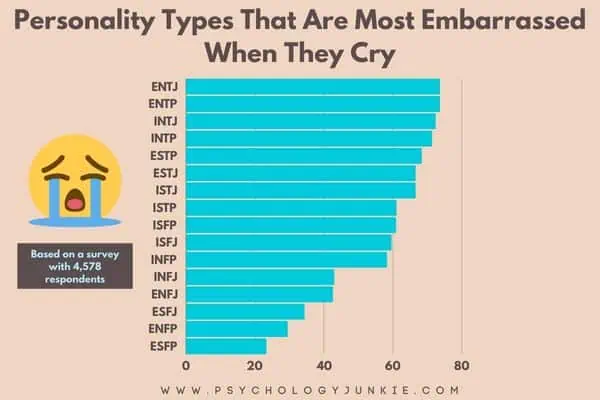
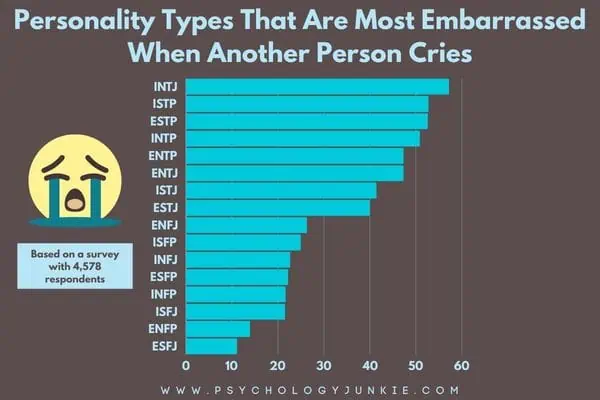
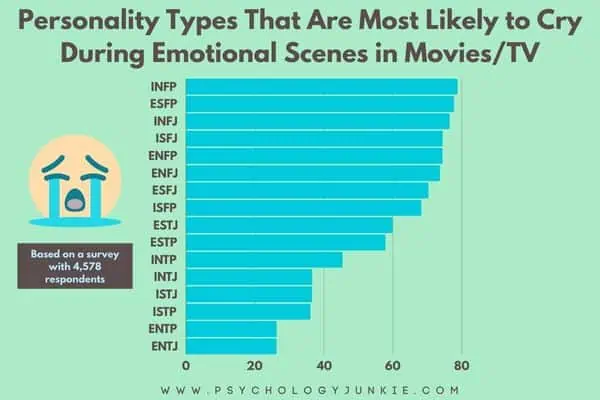
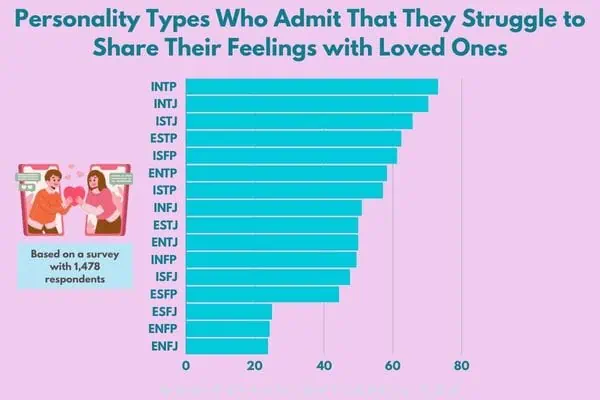




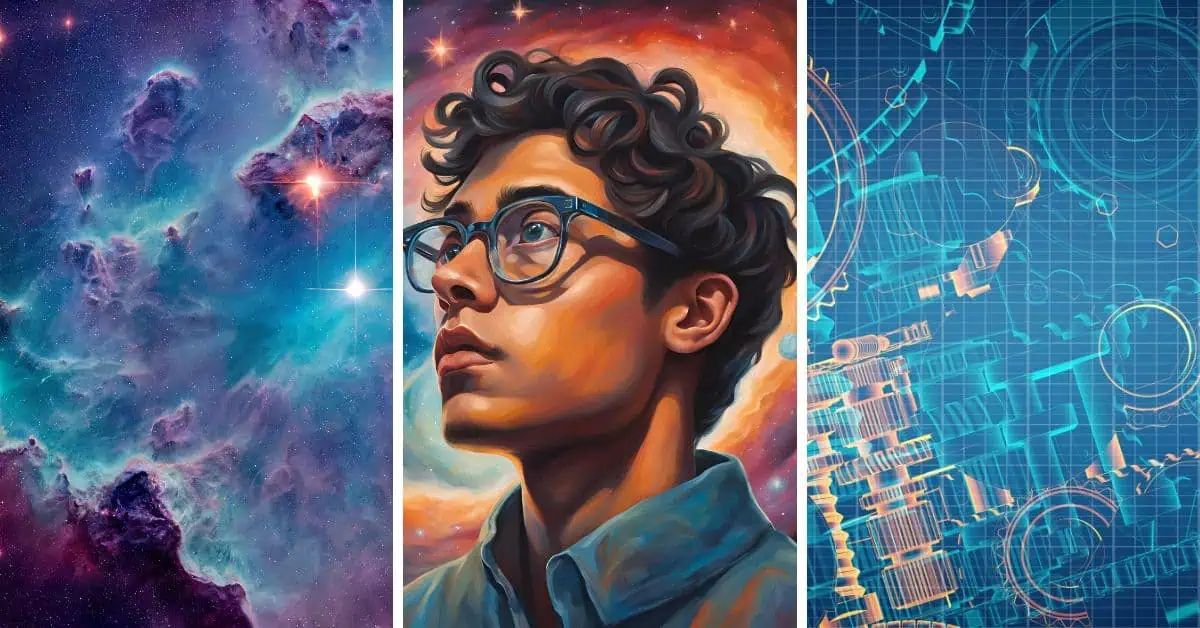
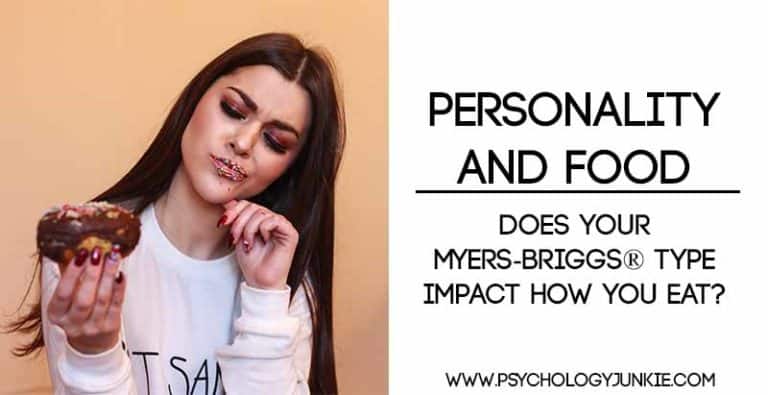
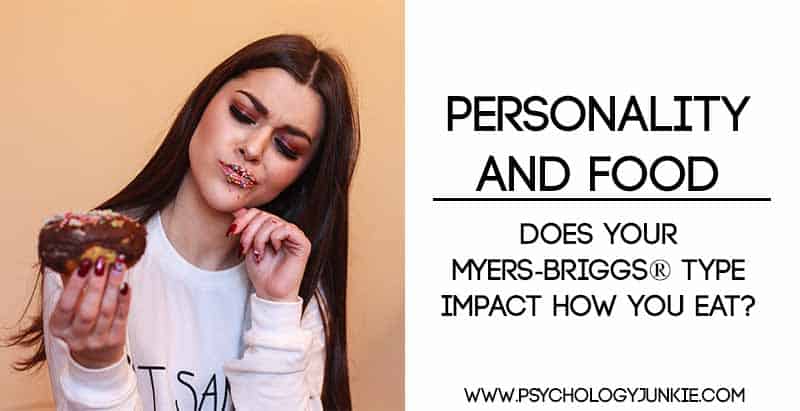
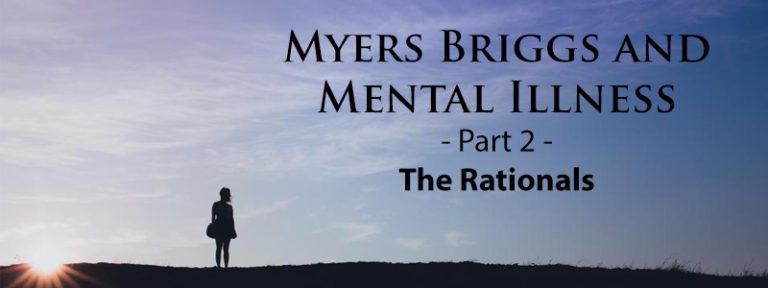
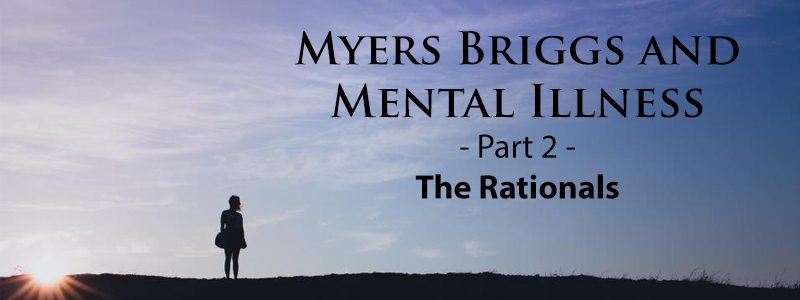
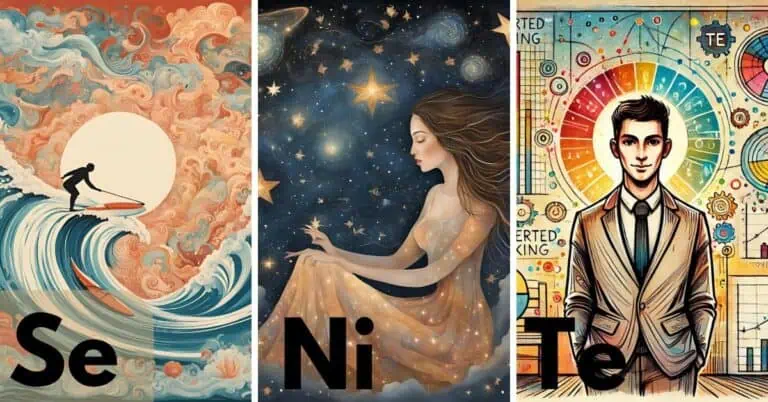
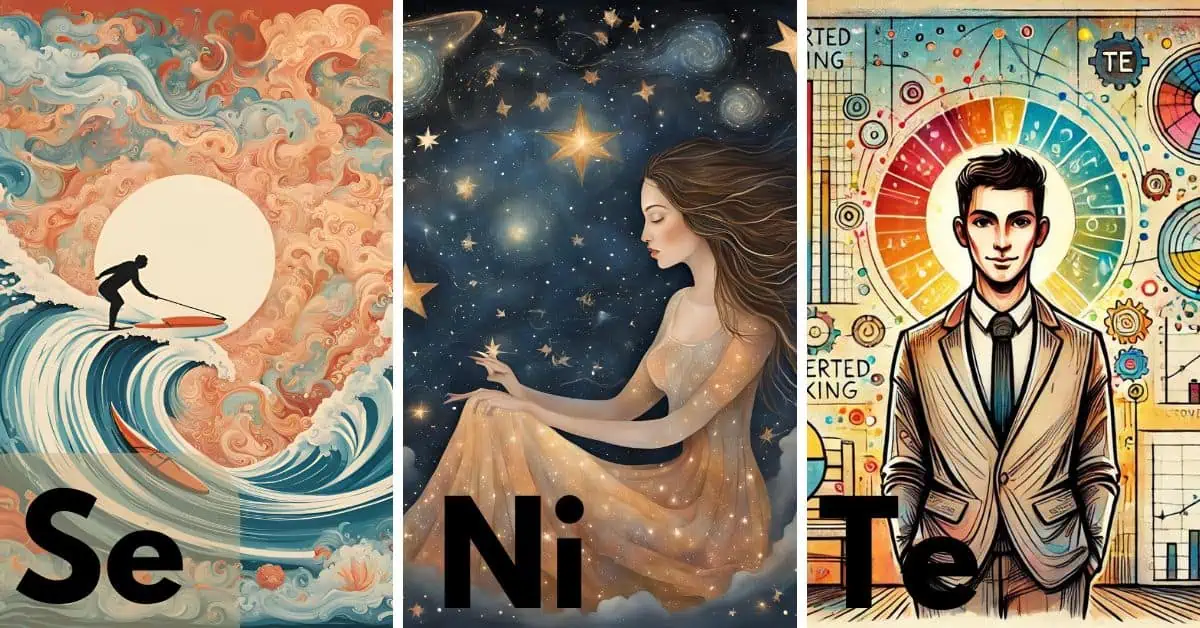
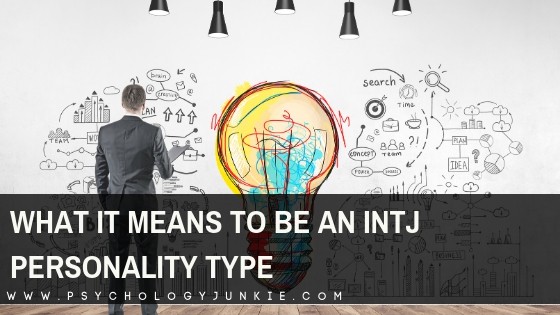
I’ve often been moved to tears at both sadness and achievements for some reason. I can watch someone I don’t even remotely know win something and somehow I feel all the effort and sacrifice it took to get that. Weddings ,funerals, grade school achievement award it doesn’t matter, I can feel it. And I hate it and have become a expert at concealing it.
INTP here…I was less guarded with my feelings during childhood and in high school, but was informed early-on after entering the workplace that expressing frustration and especially crying were not acceptable. “It’s intimidating,” one person told me. One woman who had actually made me cry castigated me in the midst of my distress, with “Vye are you crying?? Vee are not bebies…”
By the time I finished graduate school I’d learned to keep the cards close to the vest, and especially not become visibly upset in front of ESTJs or similar personalities who derived pleasure or entertainment from others’ suffering. Why give them the satisfaction? It also seemed that others assumed I was using “crocodile tears” to manipulate. Even now with my husband (whom I trust implicitly) I hate that I’m sometimes so overwrought when I need to talk that I can’t hold the tears back.
It also does often make me uncomfortable when others cry and I feel expected to empathize or respond in some way. The Christmas after my aunt passed away we were at my grandfather’s house, and in complete contrast to his usual stern, matter-of-fact demeanor he broke down and confessed that he missed his daughter. As I happened to be standing closest to him I could feel the pressure on me to go hug him or something, but as our respective personalities had made closeness difficult I did not move. My mom was behind me and moved around me to place her hands on his shoulders. I’m not sure what everyone else thought of me then or afterward, but nothing was said.
So suffice it to say that I’ve received mixed messages about crying and emotions over my lifetime, and until the world makes up its mind I’ve found it safer to keep feelings to myself, under most circumstances.
Hi Susan,
This INFJ worked (now retired) in a male dominated tech industry company as a manager. “There’s no crying in baseball.” 😂
I once cried in the car while driving home. However, I feel comfortable listening and comforting others
Well this was what I was expecting from the different types. Also being a visual learner I enjoyed seeing your graphs it made it easy to digest information and recognise patterns.
Yes, that scene of Bing Bong sacrificing himself gave us all emotional trauma. Especially watching it as a child. 🥲🤧
Love your work Susan Storm.
Regards,
An INFJ.
……I’ll actually read the article after posting this comment, but the entire reason I clicked on it is due to a thumbnail of the Dr. Who’s Weeping Angel. I’m mildly freaked out by them, and amused that someone used their picture and clearly didn’t understand what they were. Ha.
INTP here–Bing Bong’s sacrifice also makes me cry every time!
As an INXP, I haven’t cried for a long time, even when I’m sad. My wife an ENTP cries a lot, but only in front of me. She never cried in public. Sometimes I wonder, what’s wrong with me…